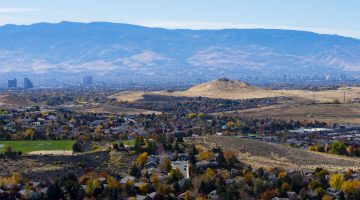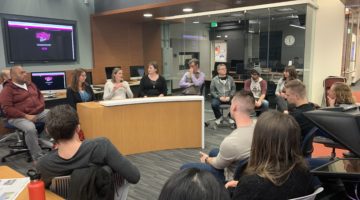
Photos courtesy of Cedrick Alcala
Over a chilly overcast weekend, the first in November, daylight savings weekend in fact, the Offbeat Music Festival took place in Reno. Approximately 100 artists, both local as well as from around the country, performed. Headliners included Americana country band Hellbound Glory, progressive metal band Consider the Source and DJ Big Chocolate.
Offbeat is unique in that there is no centralized location. The festival sprawls itself throughout the city. Co-founder Flip Wright wanted to follow in the footsteps of similar festivals, such as SXSW, Noise Pop, Boise’s Treefort festival and Portland’s MusicfestNW while keeping it authentically Reno, hence the name.
“We always thought Reno was a little different,” Wright said. “We wanted to embrace it being different. I think all of us know this place well and like some of the grungier aspects. It seemed to fit well, not only the lineup of musicians that we had, and the different genres and the music discovery aspect, but representative of Reno as well.”
 As the music festival industry expands, events like Coachella and Bonnaroo are becoming less about the music and more about creating microcosmic utopias. In that sense, Reno makes sense as a platform for a music festival to stretch itself across. It is intimate enough. Anyway, it shares several characteristics with music festivals. People fearlessly present themselves as pieces of art. People also wander around, bleary-eyed and feel entitled to urinate wherever they please. And so on and so forth.
As the music festival industry expands, events like Coachella and Bonnaroo are becoming less about the music and more about creating microcosmic utopias. In that sense, Reno makes sense as a platform for a music festival to stretch itself across. It is intimate enough. Anyway, it shares several characteristics with music festivals. People fearlessly present themselves as pieces of art. People also wander around, bleary-eyed and feel entitled to urinate wherever they please. And so on and so forth.
Venues included 3rd Street Bar, Ceol Irish Pub, Chapel Tavern, El Jefe in Circus Circus, the Eldorado Theatre, Headquarters Bar, NoVi in Eldorado, Shea’s Tavern, St. James Infirmary, Studio on 4th, the Loving Cup, the Midway in Circus Circus, Pignic Pub & Patio and Alturas on the Down Low.
Three-day general wristbands cost $49-$69. Single-day wristbands cost $30. For single shows, people could pay $10 at the door. The majority of artists were contracted through partnership showcases with different record companies, as well as fellow music festival Fisherman’s Village. Roughly 40 percent of the acts were local.
Reno’s very own Hellbound Glory opened up the festival on Thursday, Nov. 2 at 7:30 p.m. at the Saint. 30-something hipsters trickled in during the moments leading up to the show, fresh off of work, shedding their business casual attire for preshrunk cotton flannels. There also seemed to be an epidemic of cold scalps, for nearly everyone sported a beanie. I digress.
 Sidebar: I suppose this is neither here nor there, but the screwdrivers at the Saint have pulp in them. That seems like a bold move and one considered unsatisfactory to this writer. I suppose I should probably consult someone other than whoever is reading this.
Sidebar: I suppose this is neither here nor there, but the screwdrivers at the Saint have pulp in them. That seems like a bold move and one considered unsatisfactory to this writer. I suppose I should probably consult someone other than whoever is reading this.
Anyway, Hellbound Glory is self-proclaimed “scumbag country.” There were only three musicians on the stage: a washboard player, a slide guitar player and a singer who also strummed the acoustic guitar and thumped a kick drum. They sang songs about drinking alcohol while they themselves drank alcohol to a crowd of people drunk on alcohol, stomping on the floorboards, hooting and hollering. They played a poignant cover of “Where Did You Sleep Last Night?”, a traditional American folk song made famous by Nirvana on their unplugged album and “Delta Dawn” originally by Tanya Tucker.
Friday night brought Midway Madness, presented in part by local non-profit the Holland Project. Artists played at the Circus Circus midway as acrobats performed. Holland Project staples such as Lil’ Traffic and Gina Rose appeared. The main attraction, however, was L.A. dream pop heartthrob CUCO.
“He’s kind of emerging right now and is actually blowing up as we speak,” Wright said. “That’s really exciting that we have a chance to have that caliber of an emerging artist playing our festival.”
On Saturday night, 3rd Street Bar provided the trippiest experience of the festival. Psych rockers Dream Phases, Hearty Har and Sego and psychedelic DJ Al Lover, along with a light show by MAd Alchemy, turned the venue into a wavy haven.
Bibo Coffee held a benefit with the Holland Project to support KWNK, a new local radio station which broadcasts local shows including Wolf Pack Radio FM airwaves. Night Rooms, a Reno band featuring members from UNR, performed at the function.
Bay Area electronic soul band The Seshen kicked off Saturday night at the Saint, their third time performing in Reno in a year. The band’s percussionist who absolutely massacred the bongos called out “Can we just say we love Reno…Good energy is so important.” Perhaps it was just pandering, but it acted as a sort of self-fulfilling prophecy, as the comment amped up the crowd even further.
Frontwoman Lalin St. Juste, drawing influence from the likes of Erykah Badu, James Blake, Little Dragon, Portishead, Radiohead ad J Dilla, sees songwriting and performing as a cathartic conduit to self expression.
 “I think a lot about identity and the process of understanding and living in the world,” St. Juste said. “Especially as a black woman…there is a lot of things I internalize. What I write about is going against that, going against these ideas that have been determined for me. I am just deciding to rewrite my own narrative.”
“I think a lot about identity and the process of understanding and living in the world,” St. Juste said. “Especially as a black woman…there is a lot of things I internalize. What I write about is going against that, going against these ideas that have been determined for me. I am just deciding to rewrite my own narrative.”
Next up was blues collective Marty O’Reilly & the Old Soul Orchestra. They dressed like Mumford & Sons but they could sure jam out like Radiohead. Their fiddle player totally killed it (in a good way).
San Francisco swing band Royal Jelly Jive came on at 10:40. A total of four fedoras were present onstage. They opened with a cover of “Folsom Prison Blues,” originally by Johnny Cash, in a sort of carnival-LSD-Neutral-Milk-Hotel-maximalism manner, fully equipped with a clarinet and an accordion. Singer Lauren Bjelde’s delivery of the line “I shot a man in Reno, just to watch him die,” was bone-chilling.
The rest of the show was straight funk. The entire venue was rocking out. Royal Jelly Jive played a magnificent cover of “Valerie.” Usually I’m wary of anyone attempting to imitate the queen, but Bjelde had the chops to do it justice.
The night of Saturday, Nov. 4, and into the early morning, with the help of such classic musical styles, those present at the Saint were able to travel back in time, one hour to be specific. The show brought more people to the Saint than it had seen in awhile. People were packed like sardines, or some other sort of fish-related analogy that’s less cliché. It felt like a sauna despite it being near freezing outside. It smelled of sweat (and weed). Everyone still had their beanies on. The screwdrivers still had pulp in them.
“I see Reno going through a revolution, like anything else,” Wright said. “There are certain parts of it that are becoming more and more polished. I also think there’s going to be a little more of an influx of new culture here and new people coming here and bringing different things…To me, personally, it feels like there’s more of a cultural element. It’s more pervasive. You’re surrounded by different things in the arts and music. I think that’s pretty cool.”












